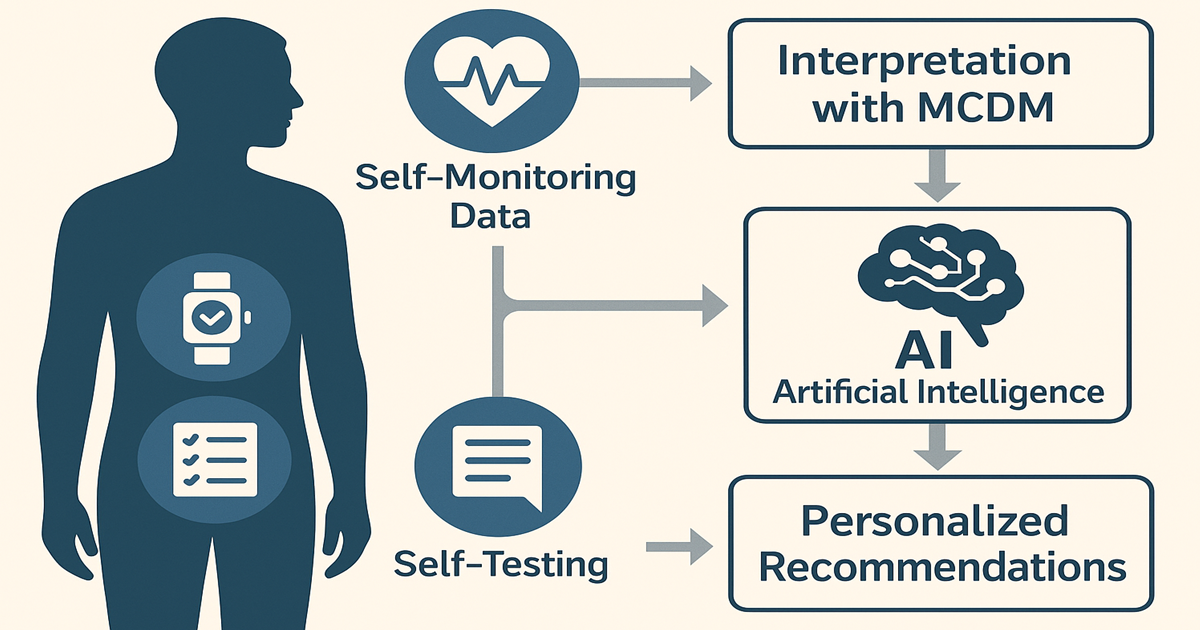AI-Driven Health and Wellbeing: Self-Monitoring, Early Detection, and Multi-Criteria Personalized Decision Support
A special issue of Applied Sciences (ISSN 2076-3417). This special issue belongs to the section "Applied Biosciences and Bioengineering".
Deadline for manuscript submissions: 20 June 2026 | Viewed by 7

Special Issue Editor
Interests: artificial intelligence; healthcare; public health; healthy lifestyle; psychomotor competencies; education; security; MCDM
Special Issues, Collections and Topics in MDPI journals
Special Issue Information
Dear Colleagues,
This Special Issue examines how artificial intelligence can support health by integrating self-monitoring data, self-testing insights, predictive modeling, and personalized lifestyle guidance and healthcare. As wearable devices, mobile apps, and digital self-assessment tools have become common; individuals have been increasingbly able to access physiological and behavioral information, yet turning these data streams into clear and meaningful recommendations remains a challenge.
We invite research regarding the use of AI techniques in trend analysis, risk prediction, and data analysis for self-testing and self-monitoring, as well as regarding adaptations to guidance over time. Further, we highlight how MCDM frameworks help ensure that suggestions are clear, sensitive to context, and aligned with people's priorities and everyday situations.
Reserachers in public health, computer science, behavioral science, digital health, sports and movement science, healthcare, and decision sciences are all welcome to contribute. Topics include, but are not limited to, the following:
- AI-based interpretation of self-monitoring and self-testing data;
- Predictive and early risk detection models;
- Data selection and feature engineering in personalized health systems;
- AI and MCDM decision support for lifestyle recommendations;
- Wearable and movement analytics in daily settings;
- Personalized guidance for exercise, nutrition, recovery, and stress management;
- Ethical and practical issues in implementing AI-supported wellbeing.
This Special Issue highlights technologically advanced yet human-centered approaches that enable health guidance to be adaptive, clear, and personally meaningful.
Prof. Dr. Stanislav Dadelo
Guest Editor
Manuscript Submission Information
Manuscripts should be submitted online at www.mdpi.com by registering and logging in to this website. Once you are registered, click here to go to the submission form. Manuscripts can be submitted until the deadline. All submissions that pass pre-check are peer-reviewed. Accepted papers will be published continuously in the journal (as soon as accepted) and will be listed together on the special issue website. Research articles, review articles as well as short communications are invited. For planned papers, a title and short abstract (about 100 words) can be sent to the Editorial Office for announcement on this website.
Submitted manuscripts should not have been published previously, nor be under consideration for publication elsewhere (except conference proceedings papers). All manuscripts are thoroughly refereed through a single-blind peer-review process. A guide for authors and other relevant information for submission of manuscripts is available on the Instructions for Authors page. Applied Sciences is an international peer-reviewed open access semimonthly journal published by MDPI.
Please visit the Instructions for Authors page before submitting a manuscript. The Article Processing Charge (APC) for publication in this open access journal is 2400 CHF (Swiss Francs). Submitted papers should be well formatted and use good English. Authors may use MDPI's English editing service prior to publication or during author revisions.
Keywords
- digital health analytics
- self-assessment data
- wearable sensor data
- behavioral and physiological indicators
- feature selection and data fusion
- adaptive decision-support systems
- hybrid evaluation models
- explainable modeling
- personalized lifestyle adaptation
- proactive wellness interventions
Benefits of Publishing in a Special Issue
- Ease of navigation: Grouping papers by topic helps scholars navigate broad scope journals more efficiently.
- Greater discoverability: Special Issues support the reach and impact of scientific research. Articles in Special Issues are more discoverable and cited more frequently.
- Expansion of research network: Special Issues facilitate connections among authors, fostering scientific collaborations.
- External promotion: Articles in Special Issues are often promoted through the journal's social media, increasing their visibility.
- Reprint: MDPI Books provides the opportunity to republish successful Special Issues in book format, both online and in print.
Further information on MDPI's Special Issue policies can be found here.





